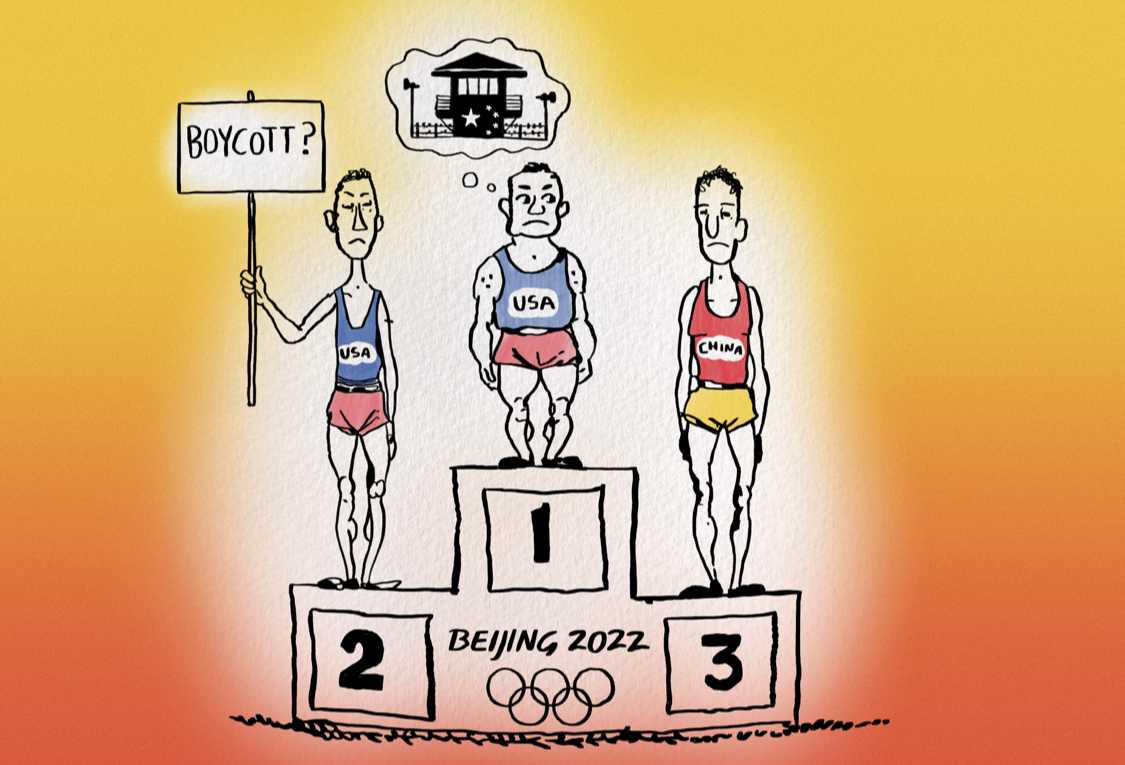
Illustration by Nick Ybarra
When the 2022 Winter Olympics in Beijing happen, American athletes must compete, lest we show the world that we as a nation lack moral fortitude.
In an April 6 news release, U.S. Department of State Spokesperson Ned Price suggested a boycott of the Beijing Olympics in order to address the Chinese government’s human rights violations. These include China’s persecution of the Chinese Muslim Uyghurs minority and its encroachment on Hong Kong’s independence.
Not only would a boycott be short-sighted and foolish, it would also be ineffectual and actively harm American athletes who’ve trained their whole lives for the opportunity to compete.
If the U.S. doesn’t participate in the 2022 Winter Olympics, it will be no show of great strength, just as our country’s 1980 boycott of the Olympics and the subsequent Soviet Union boycott of the 1984 Olympics showed us.
While the Soviet Union and the U.S. sought to make political statements, they came off less like powerhouses and more like children taking their toys home because the other countries refused to play their games.
Even if the U.S. doesn’t come off as petty for boycotting the 2022 Winter Olympics in Beijing, what good would it do?
A lack of U.S. presence at the Olympic Games wouldn’t change China’s behavior. Even more than that, we could be so much more effective if we were present.
Consider when Jesse Owens, a Black American Olympian, upended Hitler’s plans to use the 1936 Berlin Summer Olympics as a platform for racist propaganda.
According to Holocaust Encyclopedia, the Nazi’s intended for the ’36 Summer Olympics to show off a “strong Germany” and promote the myth that the “Aryan” people were physically superior.
But by winning four gold medals, Owens showed despite Nazi’s rhetoric of “Aryan” superiority, they still got beat on their own turf by a Black man the Nazi’s considered “inferior.”
While participation in the Olympic Games doesn’t equal a tacit endorsement of the host country’s affairs, China stands to make a profit from the event.
With needs of accommodations for athletes and tourists, China could make a hefty profit, which in theory could be used to fund its human rights violations.
While that ‘could be’ is a likely scenario, it doesn’t have to be.
In a March 15 New York Times article, Utah Sen. Mitt Romney highlighted a route for the U.S. to boycott the event without depriving our athletes of an opportunity
to compete.
Romney encourages spectators to stay home, depriving the Chinese government of tourism money, and for the U.S. government to invite Chinese dissidents, religious leaders and ethnic minorities to represent us instead of sending American delegates and White House officials, according to the same article.
This is all about the athletes in the end, who we’d not only deprive of their chances to globally compete should we boycott the Beijing Olympics, but we’d also deprive them of the chance to make a worldwide statement.
After all, some of the most memorable and enduring acts of protest have been made at the Olympic Games.
On this very campus, we have a statue commemorating the silent protest of John Carlos and Tommie Smith, their fists raised and heads bowed in a Black power salute against U.S. racism.
That act of defiance resonated more than any boycott, so perhaps by removing ourselves from the 2022 Beijing Winter Olympics, we could also be removing our chance to be apart of history.